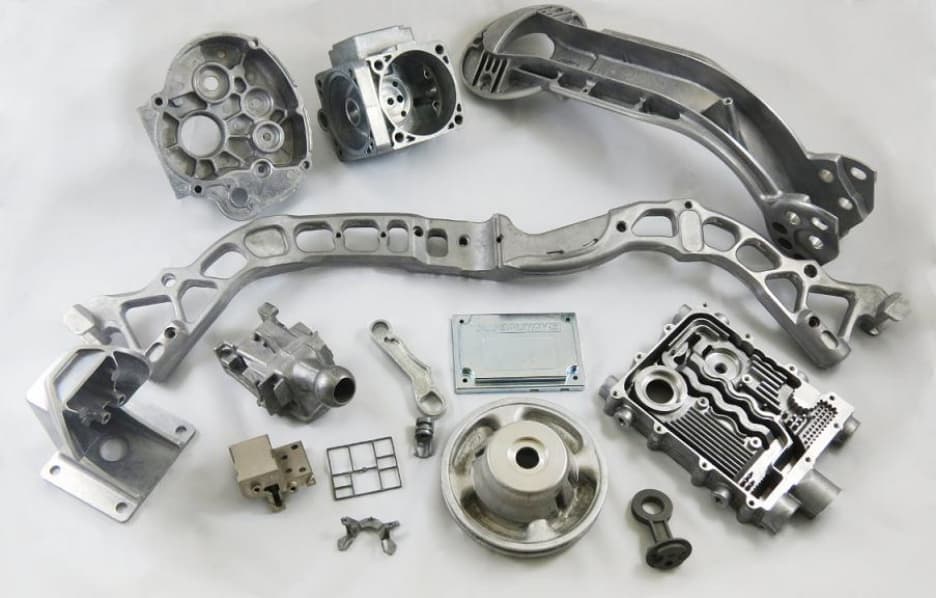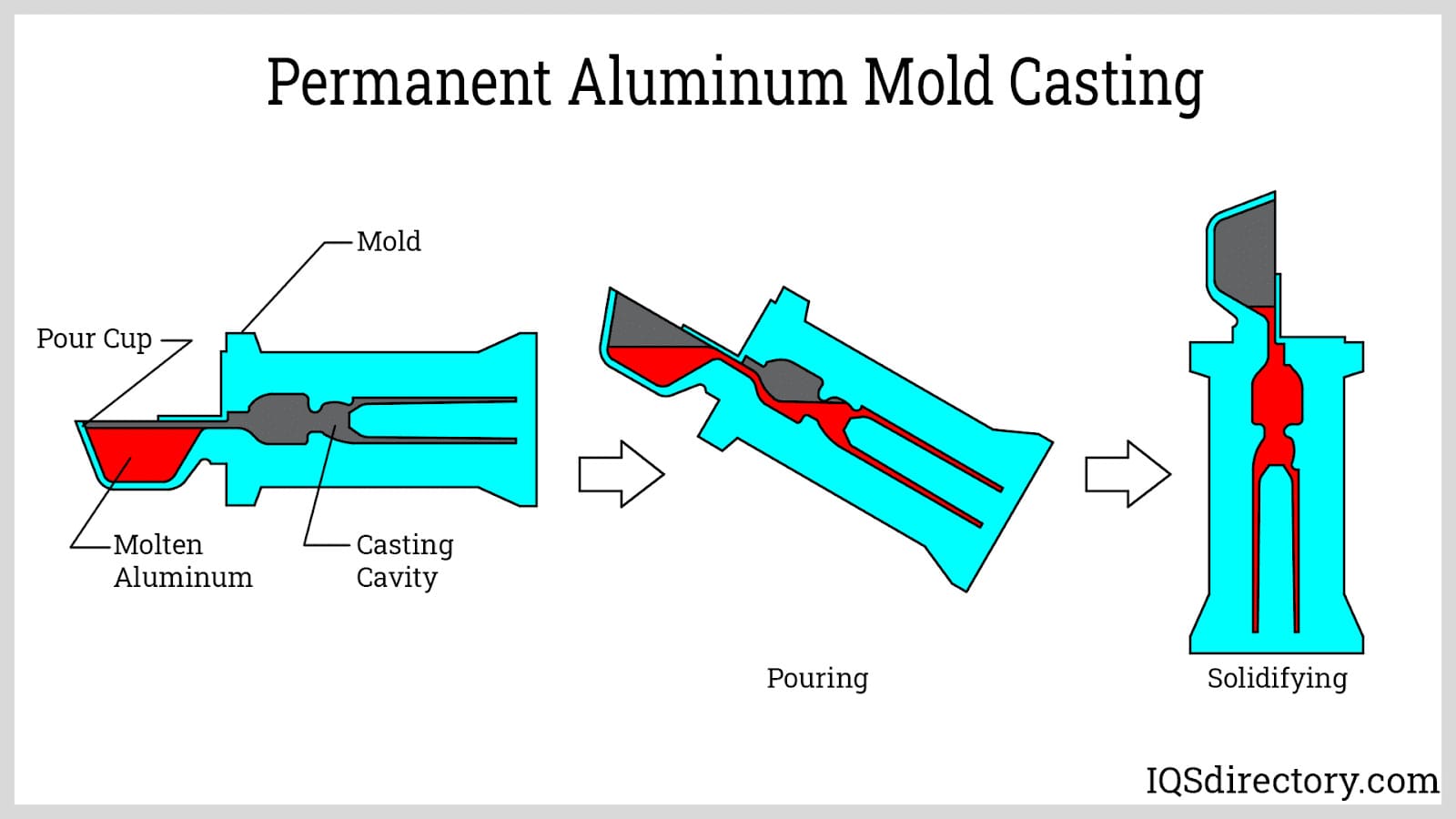Common defects in Aluminum Castings and how to prevent issues
How Aluminum Foundry Adds to Ingenious Solutions in Metal Fabrication
Aluminum shops substantially influence the landscape of steel fabrication. They adopt sophisticated casting strategies that improve precision and layout versatility. This capacity enables the manufacturing of light-weight and long lasting elements that provide to diverse sector requirements. The assimilation of automation and sustainable methods establishes a criteria for efficiency. As these factories advance, they question concerning the future of manufacturing and the duty of innovation in forming the sector.
The Duty of Aluminum Foundries in Modern Production
Aluminum shops play a crucial role in modern-day production, contributing considerably to numerous industries, including auto, aerospace, and durable goods. These facilities concentrate on the melting and spreading of aluminum, changing resources right into high-quality elements that satisfy stringent market criteria. The lightweight yet solid residential properties of Aluminum make it a perfect option for suppliers intending to boost performance while minimizing weight, specifically in the auto field, where fuel performance is critical.
Aluminum shops make use of innovative procedures to create complicated forms and designs that cater to particular market demands. By leveraging advanced technologies such as computer-aided style and simulation, these factories can optimize their production processes and enhance material utilization. This not just enhances the high quality of the end products but additionally decreases waste, adding to even more sustainable manufacturing practices. Inevitably, the contributions of Aluminum foundries are important for driving development and efficiency throughout multiple sectors.
Advanced Spreading Techniques Transforming Metal Manufacture
Advanced spreading methods are revolutionizing the area of metal manufacture, especially with precision spreading techniques that enhance precision and minimize waste. Ingenious alloy developments are additionally playing a crucial role, allowing for customized residential or commercial properties and improved efficiency in various applications. With each other, these improvements are setting new standards in effectiveness and top quality within Aluminum factories.
Precision Spreading Methods
As the need for premium elements in numerous industries remains to climb, accuracy spreading techniques have actually arised as a transformative force in steel fabrication. These methods, consisting of financial investment casting, lost foam casting, and pass away spreading, allow for complex geometries and limited tolerances that standard methods commonly struggle to accomplish. By making use of advanced products and innovations, accuracy spreading minimizes waste and improves efficiency, making it possible for manufacturers to create complicated components with decreased preparations. Additionally, these methods supply premium surface area coatings and mechanical properties, making them ideal for industries such as aerospace, auto, and clinical devices. As producers progressively embrace precision casting, the capability to meet particular style demands while maintaining cost-effectiveness ends up being a critical advantage in today's affordable market.
Cutting-edge Alloy Dopes
Innovative alloy developments are reshaping the landscape of steel fabrication, particularly within the domain name of accuracy spreading. Developments in product scientific research have actually caused the development of specialized Aluminum alloys that improve resistance, toughness, and toughness to rust. These unique alloys allow foundries to generate elaborate elements with improved mechanical homes, satisfying varied markets such as aerospace, vehicle, and electronics. The incorporation of innovative casting techniques, consisting of die spreading and sand casting, more enhances making use of these materials, enabling intricate geometries and decreased waste. As a result, suppliers are better furnished to satisfy stringent efficiency standards while reducing environmental effect. Ultimately, these cutting-edge alloys are leading the way for a brand-new era of effectiveness and sustainability in metal construction.
Resilient and light-weight: The Advantages of Aluminum Elements
Aluminum components supply considerable advantages in different applications as a result of their lightweight nature and sturdiness. This combination adds to boosted gas effectiveness, particularly in the aerospace and automobile sectors. Additionally, aluminum's inherent corrosion resistance better prolongs the lifespan of items, making it a recommended choice in lots of steel fabrication procedures.
Enhanced Fuel Effectiveness
While traditional materials have long been the standard in various markets, the change towards Aluminum parts is revolutionizing the landscape of metal construction, especially in regard to enhanced gas performance. Light weight aluminum's light-weight nature especially decreases the general weight of automobiles and equipment, permitting for boosted efficiency and lowered power intake. This decrease in weight converts directly to lower fuel consumption, making Aluminum an appealing choice for makers aiming to satisfy strict environmental policies. Furthermore, aluminum's longevity warranties that parts preserve their stability gradually, adding to long-term efficiency. As sectors significantly focus on sustainability, the fostering of Aluminum elements ends up being a calculated option, aligning functional goals with ecological obligation while improving fuel efficiency in various applications.
Deterioration Resistance Conveniences
One of the standout features of Aluminum parts is their remarkable deterioration resistance, which greatly boosts the durability and dependability of different applications. This building is especially helpful in rough settings, such as aquatic and commercial settings, where direct exposure to moisture and chemicals can lead to significant deterioration in other steels. Unlike steel, Aluminum naturally creates a protective oxide layer that acts as an obstacle against environmental elements, decreasing the danger of corrosion and corrosion. As an outcome, Aluminum parts need much less maintenance and have a longer solution life, making them an economical choice for suppliers. This integral sturdiness not just adds to the total performance of items but likewise sustains sustainability efforts by decreasing the need for frequent substitutes.
Innovations in Style and Engineering Via Aluminum Foundries
As advancements in Aluminum Foundry innovation proceed to reshape the landscape of metal websites fabrication, cutting-edge design and engineering remedies are arising to meet the needs of varied markets. The adaptability of Aluminum enables complex layouts that were previously unattainable with conventional materials. Factories are leveraging computer-aided design (CAD) software application and simulation tools to maximize the design procedure, enabling engineers to develop light-weight yet robust parts tailored to details applications.
Furthermore, the capacity to integrate advanced alloying strategies allows the customization of Aluminum homes, enhancing stamina and resilience. This adaptability fosters creative thinking in product development, enabling companies to experiment with new shapes and frameworks that improve capability while lowering weight. Joint initiatives between developers and factories promote fast prototyping, causing much shorter job timelines and enhanced overall performance. click over here now These advancements not just enhance product performance however likewise drive sustainability by lessening product waste during the manufacture procedure.
Enhancing Efficiency With State-Of-The-Art Innovation
Innovations in cutting edge innovation are changing the efficiency of Aluminum factories, improving processes from layout to manufacturing. Automation plays a critical function, with robotic systems improving the speed and accuracy of tasks such as molding, pouring, and finishing. These automated services decrease human mistake and lower labor expenses, while likewise increasing outcome consistency.
In addition, the combination of sophisticated software application for computer-aided design (CAD) and simulation allows for quick prototyping and testing, accelerating the shift from idea to manufacturing. Foundries are utilizing real-time data analytics to check operations, making sure peak efficiency and decreasing downtime.
Moreover, 3D printing innovation is being taken on for producing intricate molds and components, minimizing material waste and preparation. The mix of these cutting-edge technologies not just enhances performance yet likewise improves the quality of Aluminum products, positioning shops at the leading edge of advancement in metal fabrication.
Lasting Practices in Aluminum Foundries
A growing variety of Aluminum foundries are taking on lasting practices to reduce their environmental effect and promote source efficiency. Aluminum Foundry. These shops are significantly implementing recycling programs, where scrap Aluminum is collected and reprocessed, greatly reducing waste. Furthermore, energy-efficient innovations, such as electric furnaces and advanced insulation products, are being used to reduced energy consumption during the melting process
Water conservation techniques are also obtaining grip, with numerous factories reusing water in cooling down systems to lower total use. Moreover, the fostering of environment-friendly layers and ingredients reduces damaging discharges without jeopardizing product top quality.
Future Fads in Aluminum Casting and Metalworking
Progressively, the future of Aluminum spreading and metalworking is being formed by technological developments and developing sector requirements. Advancements in automation and robotics are enhancing processes, enhancing accuracy, and minimizing labor costs. The adoption of additive manufacturing methods, such as 3D printing, is changing typical casting techniques, permitting for complicated geometries and lowered product waste.
The Related Site combination of fabricated intelligence and information analytics is enabling real-time surveillance and predictive upkeep, which maximizes production efficiency. Sustainability stays a core emphasis, with companies buying eco-friendly methods, including the recycling of Aluminum scrap and using renewable resource sources in manufacturing.
As the need for light-weight, resilient materials in numerous industries boosts, Aluminum shops must adapt by improving and creating innovative alloys spreading techniques. These trends collectively indicate a future where Aluminum casting and metalworking are more effective, sustainable, and receptive to market needs.

Regularly Asked Concerns
What Kinds Of Aluminum Alloys Are Frequently Made Use Of in Shops?
Generally made use of Aluminum alloys in factories include 2xxx series (copper), 3xxx collection (manganese), 4xxx collection (silicon), 5xxx series (magnesium), and 6xxx series (magnesium and silicon), each offering unique residential or commercial properties suitable for different applications.
Exactly How Does Aluminum Casting Contrast to Various Other Metal Fabrication Methods?
Aluminum casting offers benefits such as lower production costs and complex forms contrasted to standard fabrication methods. It offers superb dimensional accuracy and surface coating, making it a favored choice for many industries over choices like machining or welding.
What Security Steps Are Implemented in Aluminum Foundries?
Aluminum shops apply various precaution, including individual protective devices, ventilation systems, normal security training, threat evaluations, and emergency situation procedures to shield employees from risks connected with molten metal, warmth, and prospective chemical direct exposure. Aluminum Foundry.
How Can Business Locate Reliable Aluminum Foundry Partners?
Companies can recognize reliable Aluminum Foundry partners by examining sector reputation, evaluating customer testimonies, evaluating quality accreditations, thinking about manufacturing capacities, and conducting website check outs to ensure placement with their certain demands and requirements.

What Is the Typical Lead Time for Aluminum Casting Projects?
The normal lead time for Aluminum spreading tasks ranges from 2 to 8 weeks, relying on variables such as layout intricacy, production volume, and the foundry's capacity to meet details task demands and timelines.
Aluminum factories play a vital function in modern production, adding significantly to numerous sectors, including auto, aerospace, and customer goods. As advancements in Aluminum Foundry innovation continue to reshape the landscape of steel construction, innovative layout and engineering services are emerging to fulfill the demands of diverse sectors. Developments in advanced modern technology are transforming the effectiveness of Aluminum factories, enhancing processes from design to production (Wisconsin Aluminum Foundry). An expanding number of Aluminum shops are taking on lasting methods to minimize their environmental influence and promote source efficiency. As the need for lightweight, sturdy materials in numerous industries rises, Aluminum foundries should adjust by establishing cutting-edge alloys and enhancing casting strategies